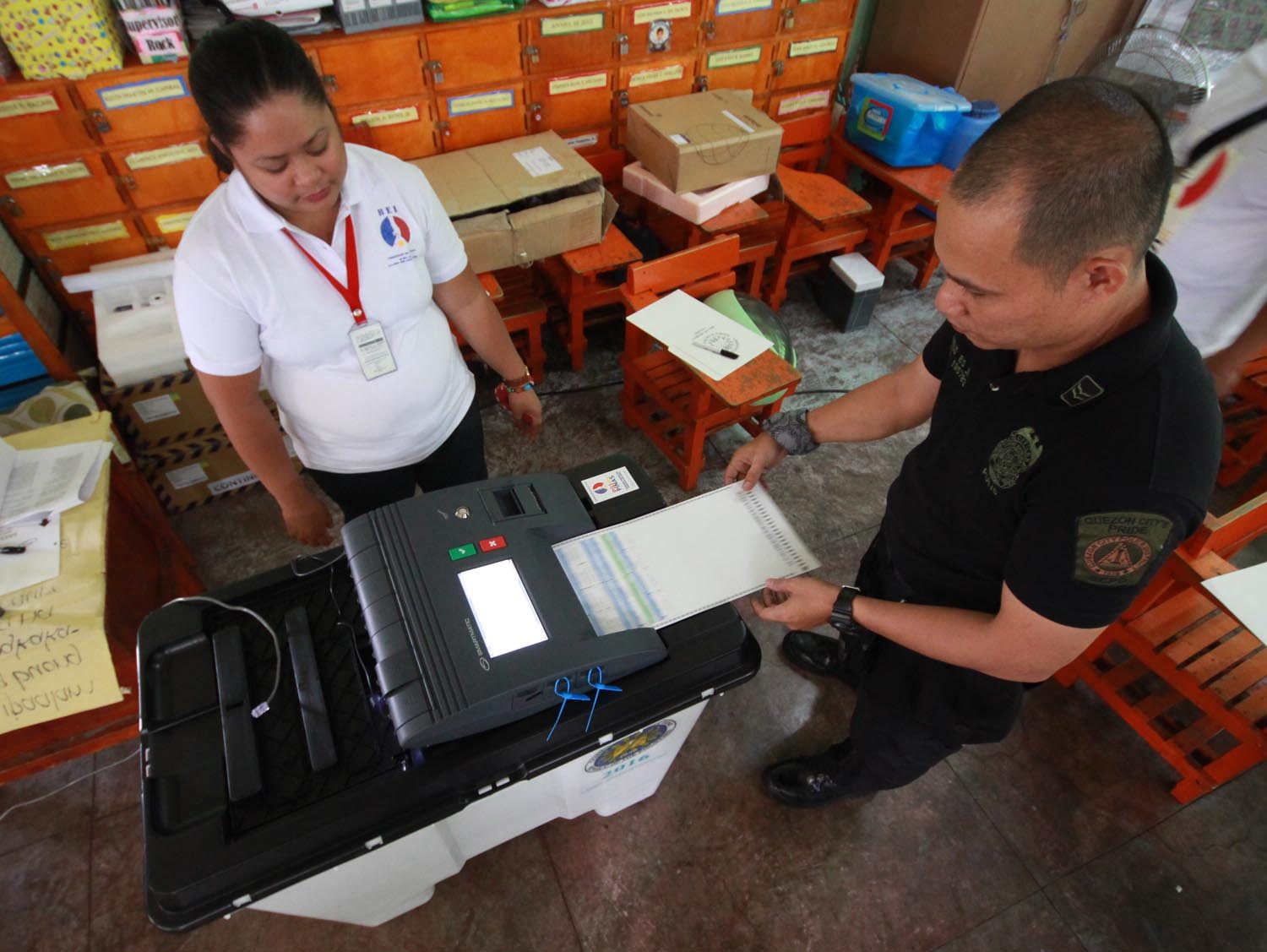SUMMARY
This is AI generated summarization, which may have errors. For context, always refer to the full article.

MANILA, Philippines – The Commission on Elections (Comelec) on Tuesday, February 16, defended its unanimous decision not to issue receipts from vote-counting machines (VCMs) on election day.
In a joint congressional hearing, Comelec Chairman Andres Bautista said the poll body junked the proposal to issue receipts for two main reasons.
First, he said, politicians can use the receipts in vote buying. Second, issuing receipts can add 5-7 hours to the voting time in election precincts.
“The disadvantages of printing the receipts far outweigh the advantages,” Bautista said in a hearing of the joint congressional oversight committee (JCOC) on the automated election system.
Bautista also said a “big concern” is that “there might be losing candidates who might question the results, basically instructing their supporters that when the machine prints out the receipt, regardless of what the receipt says, they will say that it’s not correct.”
“And this kind of organized conspiracy of a losing candidate can really cast doubt on the credibility of the elections,” the Comelec chairman said.
He said this is why the Comelec en banc, or the commission sitting as a whole, voted 7-0 “not to enable the feature of printing the receipt.”
Alongside the issue of printing receipts, another proposal discussed during the hearing is displaying the votes on the VCM screen.
Bautista said the Comelec has not made a “hard decision” on displaying votes on the VCM screen. Still, election commissioners have made a preliminary vote on this topic: 4-2, in favor of not activating this feature.
Chong: ‘I find it so absurd’
The Comelec, however, drew ire for junking these verification features for the general public even as it activated a similar mechanism for persons with disability (PWDs).
Bautista said the Comelec is activating a feature to allow blind or illiterate voters to double-check the votes cast by “assisters” on their behalf.
He said the poll body, for one, spent on headphones to help blind or illiterate voters in verifying whether or not the assister really followed his or her instructions. The headphones will allow PWDs to “hear the names of the candidates” they voted for.
Glenn Chong, a former congressman who said he was a victim of cheating, questioned why the Comelec has this verification feature for PWDs but not for the general public.
“I find it so absurd, your honor,” Chong told Senator Aquilino Pimentel III, chairman of the JCOC on the automated election system.
“It’s so absurd that most of us, we are able-bodied, we can read, we can write, yet we are prevented from verifying our ballots, whereas the few PWDs, without bias to them, they are willing to allot money for them,” Chong said.
Brillantes: ‘Mas magaling pa si Mr Chong’
Eventually, former Comelec Chairman Sixto Brillantes Jr shot back at Chong.
Known for his short temper when it comes to critics, Brillantes said previous sets of Comelec members already voted unanimously to junk the printing of receipts from vote-counting machines.
Brillantes said that, in 2010, the Comelec already voted 7-0 against the voting receipts.
The Comelec issued another 7-0 ruling against the voting receipts in 2013.
“Ngayon, 2016, ni-reject na naman ng pito,” Brillantes said, referring to 7 members of the poll body. (Now, in 2016, it’s again being rejected by 7.)
“Hindi ko alam kung bakit mas magaling pa si Mr Chong doon sa 21 na commissioners,” he said. (I don’t know why Mr Chong seems to know more than the 21 commissioners.)
Chong replied: “Your honor, it does not necessarily mean that if the Comelec rejected it, that becomes truthful and legal. It does not, Mr Brillantes.”
Minutes later, Brillantes walked out of the session hall after other election watchdogs started speaking. On his way out, the former elections chief mumbled, “As usual.”
Watchdog: ‘Forget ease in voting’
Maricor Akol of the group Automated Election System Watch, for her part, said the Comelec seems bent on junking the voting receipts despite the demands of election watchdogs.
“May kasabihan nga na ‘pag ayaw, maraming dahilan,” Akol said. (There’s a saying that if you don’t want it, you can come up with excuses.)
She stressed that the Comelec should order the printing of receipts because of the “close fight” for government posts in 2016.
Akol said: “Forget the speed, forget the ease in voting. What should be done is that you must make the people accept the results.”
Despite these claims, veteran election lawyer Romulo Macalintal said: “I fully agree with the Comelec that there is a danger in printing or giving receipts to the voters, in terms of vote buying and in terms of delaying the conduct of the elections.”
Pimentel said he is appealing to the Comelec “to revisit their decision” on voting receipts, but said he understands the poll body’s position.
On one hand, he said, there’s a way to address concerns that politicians will use receipts in vote buying. That is, to have voters leave the receipts in the voting precincts.
Pimentel, on the other hand, said he agrees with the Comelec that issuing receipts can lengthen the voting process. He said, “I also see their point.” – Rappler.com
Add a comment
How does this make you feel?
There are no comments yet. Add your comment to start the conversation.